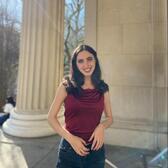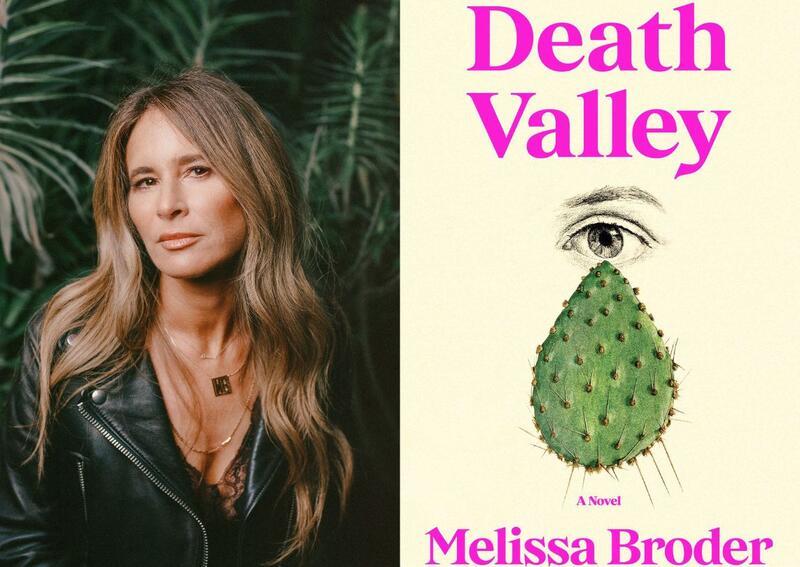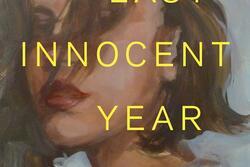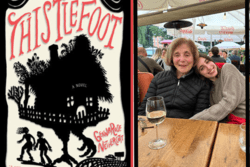Grief is a Desert in 'Death Valley'
Warning: Spoilers ahead!
Desert symbolism is a staple of the Jewish literary canon—the land, though literally barren, provides our biblical heroes opportunities for transformation and freedom. Melissa Broder’s latest novel, Death Valley, takes place in Southern California, not Canaan or Egypt, but the American desert proves similarly ripe for catharsis. When the unnamed narrator loses herself in the titular Death Valley, she finds room in the vast expanse to mourn the impending loss of her father and to understand her own mortality in her fight to survive.
I picked up this book recently not because I’m fascinated by the desert myself. As a born-and-raised East Coaster, I’m not sure I could survive a supervised hike out there, let alone being lost and alone for days. Instead, my reasons were: 1) I loved Melissa Broder’s 2019 Milkfed (which is just as delightfully wacky as Death Valley); and 2) My own mind has been simmering with the reality of death, and how to understand it, recently.
Superstition, God, and magic fill the terrain of the novel, popping up everywhere like cacti in the sand, even before the narrator finds herself in the mystical desert. After her father is seriously injured in a car accident, the narrator must handle her mother’s obsessive and superstitious beliefs about her husband’s unstable condition. The mother warps the Yiddish phrase kinehora—the phrase to ward off the evil eye—to mean the evil eye itself, to which the narrator responds with light exasperation,“[A]ny form of positive thinking is sure to bring the kinehora on. Life getting better? ‘No kinehora.’ Believe you have redeeming value as a human being? ‘Don’t kinehora yourself.’” Early in the novel, the narrator buys her father a pair of sweatpants for his anticipated rehab stay, and her mother responds in a frenzy, “It’s like buying a gift for an unborn baby. You don’t do it. Something might happen to the baby before it’s born.”
The narrator regards her mother’s belief in the evil eye as irrational and ridiculous, driven by her inability to emotionally process her husband’s precarious condition. In opposition, the narrator tempts fate—maybe even actively seeking out the jinx—by driving herself into the desert, away from the intensity of her family. She pushes herself on dehydrated hikes, finding a cactus that opens up to reveal mystical visions of her father as a child (yep, you read that right), and new ways of understanding her grief. After this inexplicable discovery, she finds herself checking out of the Best Western and setting off alone to hunt for answers in the desert. And… getting lost.
Although the narrator views herself as different from her mother, it becomes evident that the mother’s superstitious processing of trauma is mirrored in the narrator’s spiritual one. While lost, she searches high and low for the fantastical cactus, and on the way she has hallucinatory conversations with anthropomorphized rocks, catches snippets of self-help podcasts on her dying phone, muses about agnosticism, and prays to objects and spirits and God for her survival.
Although I honestly half-expected the novel to end in the narrator’s death, she’s eventually rescued. Right before her redemption, she’s finally able to return to the cactus. In its magical walls, she suddenly transforms into a baby, being nurtured by her young father. A few pages later, she buries his body. Over the course of her desert journey, she sees the complete cycle of his life, and names the now-unavoidable truth that applies to him, herself, and all living things: “Oh my god, I exist. Oh my god, I have to die.”
In between the hilarity of the narrator’s journey and the poignancy of her realizations, I found myself questioning my own experiences with grief and (metaphorical) lostness. What is the role of belief in some higher power or order in processing life’s mysteries?
When my high school friend passed away last March after battling injuries from a car accident, I went back to our hometown for the funeral and shiva. I took repetitive walks in the damp New England woods by my mom’s house, the wind biting at my cheeks, squirrels nearly tumbling over my feet as they emerged from their winter shelters with ironic hope. In the weeks and months following his death, I mentally replayed the episodes of our friendship, starting with our close teenagedom. The more sparse, but always loving, communication and visits during our college years. The final, flickering months right after graduation, between his accident and his death (marked on my side by depression, avoidance, and regret).
In some dull, comfortable corner of my brain, I’d always imagined that post-graduation, my friend and I would be checking out each other’s apartments in Brooklyn and DC. We probably would’ve vehemently disagreed on politics, as we always had. We would’ve eaten more ice cream together at our favorite spot in Boston, and then driven to a thrift shop, where he would’ve plucked out the most hideous t-shirt in the place with a grin on his face. We would’ve had more conversations, more chapters of our friendship, more chances to see what we brought to each other’s lives as they unfolded.
Our Massachusetts hometown was ecologically the furthest thing from the desert of the Wild West, yet like the narrator in Death Valley, I felt stuck, thirsty after my friend died. I knew that there was no kinehora that could’ve prevented his death, no zany, magical cactus that could let me talk to him again. No God—I felt, despite my friend’s unwavering Jewish faith during his lifetime—to explain why he died just before he turned 23.
In Death Valley, the narrator and her mother rely on superstition and magic and faith to process grief, but even these touchstones can’t offer satisfying answers. In a twist towards the end, the narrator encounters a large bird who announces her father’s fate. But when she’s rescued and taken to her father, she finds that the bird’s decree was false. There are no magical, religious, or superstitious ways around the inexplicability of human existence.
Yet I’ve learned—not just from Melissa Broder, but also from my friends, family, and other writers who’ve dealt with grief—that though there isn’t always an explanation or a resolution, rituals and beliefs can help ground us in life’s uncertainties. Maybe the kinehora that protected my soul after my friend died was the music I listened to on repeat during those awful first few weeks. Maybe I was searching for God in the words of the mourner’s kaddish that unexpectedly spilled out of me on the High Holidays. Maybe I’ve drunk from my own cactus in the way I’ve relied on our shared community; my memories of my friend and his complex, wonderful self; my walks in the woods on the cusp of springtime.
Grief is its own type of desert. It parches our throats, tests our capacity for recovery, and often unfurls before us as barren and hopeless. We’re all in our own modes of survival. Sometimes we’re rescued; frequently we’re just lost. All we have is each other, and the mysteries and rituals that may confuse us, help us grow, and lead us to freedom, all in time.







